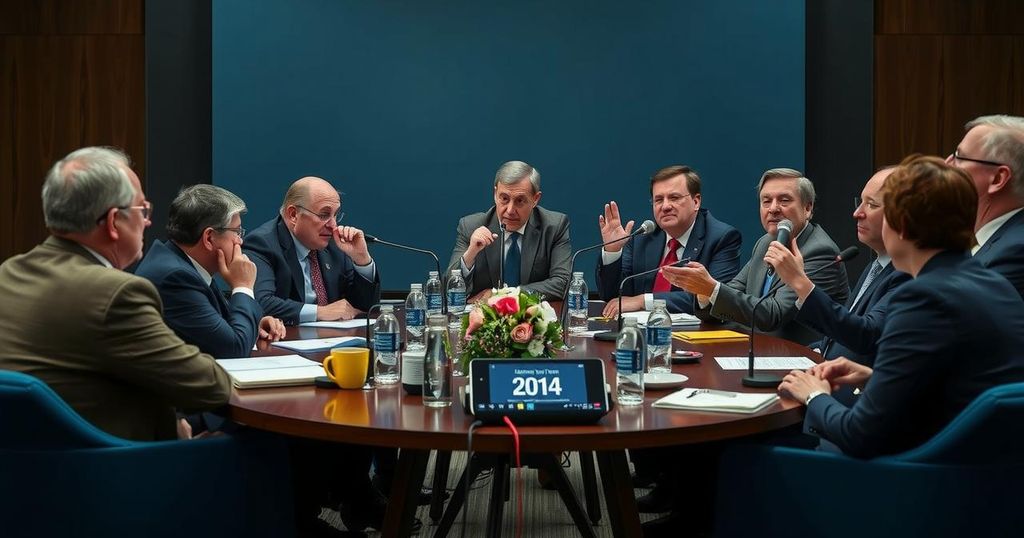Business
economics
Global news
AGENCIA BRASIL, BRAZIL, CENTRAL BANK, DENMARK, ENVIRONMENT AND CLIMATE, ENVIRONMENTAL POLICY, EUROPE, FOREIGN AFFAIRS, G20, LU, LUIZ INÁCIO DA SILVA, LULA, PARIS AGREEMENT, QUIT, RIO, RIO DE JANEIRO, SOUTH AMERICA, SUSTAINABLE DEVELOPMENT, TASK FORCE FOR GLOBAL MOBILIZATION AGAINST CLIMATE CHANGE, TRADE RELATIONS, UN, UNITED NATIONS
Marcus Li
0 Comments
Lula Advocates for Enhanced Climate Action at G20 Summit
During the G20 summit in Rio de Janeiro, Brazilian President Lula urged developed countries to advance climate neutrality targets from 2050 to 2040 or 2045. He emphasized accountability for historical emissions and called for enhanced commitments, especially from major greenhouse gas emitters. Lula also highlighted Brazil’s advancements in renewable energy and urged international collaboration to effectively address climate challenges, advocating for the formation of a UN Climate Change Council.
During a recent G20 summit held in Rio de Janeiro, Brazilian President Luiz Inácio da Silva urged developed nations to expedite their climate neutrality goals, advocating for a shift from the current target of 2050 to as early as 2040 or 2045. Emphasizing the importance of collective progress, he stated, “Even if we’re not moving at the same speed, we can all take a step forward.” He called for accountability among industrialized nations due to their historical contributions to greenhouse gas emissions, invoking the principle of common but differentiated responsibilities as foundational to climate justice. Lula highlighted that the continued deterioration of climate conditions cannot be ignored, recalling the origin of crucial UN agreements in Rio de Janeiro approximately thirty years ago amid the current climate crisis. He pointed out that despite past efforts, significant gaps remain in achieving essential outcomes. The president noted that G20 representatives, who collectively contribute to a substantial share of global emissions, will need to enhance their commitments significantly. Brazil’s Climate Action Strategy, which includes the Task Force for Global Mobilization against Climate Change, aims to align new Nationally Determined Contributions (NDCs) with the objective of limiting global temperature increase to 1.5 degrees Celsius. Highlighting Brazil’s renewable energy advancements, Lula declared that 90% of the country’s electricity is derived from renewable sources. Additionally, he reassured that the nation’s emission reductions would be largely driven by reduced deforestation. Call for global support was paramount, as Lula expressed that true conservation efforts could only succeed if all nations preserve their environments without compromising on deforestation. He recognized the collaboration extended by G20 countries towards the establishment of the Tropical Forests Forever Fund, which incentivizes developing countries to maintain their forests. The Brazilian president also criticized the lack of adherence to international funding promises made during the establishment of the Paris Agreement, urging wealthier nations to provide the necessary financial resources for climate remediation efforts. He emphasized that “No ambition can be sustained without the means to implement it,” reiterating the need for coherent financial plans for ecological initiatives. Before concluding, Lula invited the assembly to consider the formation of a UN Climate Change Council to streamline global climate efforts. The summit reflected the dire need for urgent collective action against climate challenges and set the stage for Brazil’s leadership leading up to COP30 in 2025, where Lula opined it would be vital for the world to avoid irreversible climate damage. The G20, which consists of multiple influential countries globally, plays a pivotal role in this collaborative mission towards addressing pressing environmental issues.
The remarks made by President Luiz Inácio da Silva at the G20 summit underline the critical nature of international climate commitments and the varying responsibilities of developed and developing nations in addressing climate change. The urgency for enhanced climate action is paramount, especially given the alarming effects of climate change experienced globally, such as rising temperatures and extreme weather events. The G20, composed of the world’s major economies, is in a unique position to not only set significant climate policies but also ensure that financial and structural support is allocated effectively to combat these pressing environmental concerns.
In conclusion, President Lula’s address at the G20 summit highlights the necessity for developed nations to elevate their climate commitments to mitigate the ongoing climate crisis. The emphasis on accountability, the call for adequate funding provisions, and the advocacy for immediate action reflect a broader vision for a collaborative global effort in achieving environmental sustainability. With COP30 approaching, Lula’s leadership aims to catalyze international cooperation necessary for safeguarding the planet against further climate degradation.
Original Source: en.mercopress.com




Post Comment